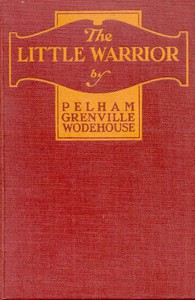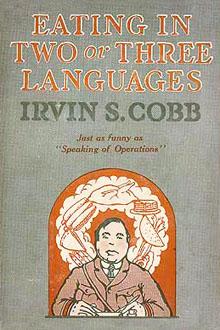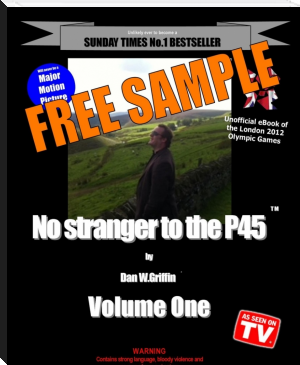The Little Warrior by P. G. Wodehouse (top 50 books to read txt) 📗

- Author: P. G. Wodehouse
Book online «The Little Warrior by P. G. Wodehouse (top 50 books to read txt) 📗». Author P. G. Wodehouse
When one considers how full of his own troubles, how weighed down with the problems of his own existence the average playgoer generally is when he enters a theatre, it is remarkable that dramatists ever find it possible to divert and entertain whole audiences for a space of several hours. As regards at least three of those who had assembled to witness its opening performance, the author of “Tried by Fire,” at the Leicester Theater, undoubtedly had his work cut out for him.
It has perhaps been sufficiently indicated by the remarks of Parker, the valet, that the little dinner at Freddie Rooke’s had not been an unqualified success. Searching the records for an adequately gloomy parallel to the taxi-cab journey to the theatre which followed it, one can only think of Napoleon’s retreat from Moscow. And yet even that was probably not conducted in dead silence. There must have been moments when Murat got off a good thing or Ney said something worth hearing about the weather.
The only member of the party who was even remotely happy was, curiously enough, Freddie Rooke. Originally Freddie had obtained three tickets for “Tried by Fire.” The unexpected arrival of Lady Underhill had obliged him to buy a fourth, separated by several rows from the other three. This, as he had told Derek at breakfast, was the seat he proposed to occupy himself.
It consoles the philosopher in this hard world to reflect that, even if man is born to sorrow as the sparks fly upwards, it is still possible for small things to make him happy. The thought of being several rows away from Lady Underhill had restored Freddie’s equanimity like a tonic. It thrilled him like the strains of some grand, sweet anthem all the way to the theatre. If Freddie Rooke had been asked at that moment to define happiness in a few words, he would have replied that it consisted in being several rows away from Lady Underhill.
The theatre was nearly full when Freddie’s party arrived. The Leicester Theatre had been rented for the season by the newest theatrical knight, Sir Chester Portwood, who had a large following; and, whatever might be the fate of the play in the final issue, it would do at least one night’s business. The stalls were ablaze with jewelry and crackling with starched shirt-fronts; and expensive scents pervaded the air, putting up a stiff battle with the plebeian peppermint that emanated from the pit. The boxes were filled, and up in the gallery grim-faced patrons of the drama, who had paid their shillings at the door and intended to get a shilling’s-worth of entertainment in return, sat and waited stolidly for the curtain to rise.
First nights at the theatre always excited Jill. The depression induced by absorbing nourishment and endeavouring to make conversation in the presence of Lady Underhill left her. The worst, she told herself, had happened. She had met Derek’s mother, and Derek’s mother plainly disliked her. Well, that, as Parker would have said, was that. Now she just wanted to enjoy herself. She loved the theatre. The stir, the buzz of conversation, the warmth and life of it, all touched a chord in her which made depression impossible.
The lights shot up beyond the curtain. The house-lights dimmed. Conversation ceased. The curtain rose. Jill wriggled herself comfortably into her seat, and slipped her hand into Derek’s. She felt a glow of happiness as it closed over hers. All, she told herself, was right with the world.
All, that is to say, except the drama which was unfolding on the stage. It was one of those plays which start wrong and never recover. By the end of the first ten minutes there had spread through the theatre that uneasy feeling which comes over the audience at an opening performance when it realises that it is going to be bored. A sort of lethargy had gripped the stalls. The dress-circle was coughing. Up in the gallery there was grim silence.
Sir Chester Portwood was an actor-manager who had made his reputation in light comedy of the tea-cup school. His numerous admirers attended a first night at his theatre in a mood of comfortable anticipation, assured of something pleasant and frothy with a good deal of bright dialogue and not too much plot. Tonight he seemed to have fallen a victim to that spirit of ambition which intermittently attacks actor-managers of his class, expressing itself in an attempt to prove that, having established themselves securely as light comedians, they can, like the lady reciter, turn right around and be serious. The one thing which the London public felt that it was safe from in a Portwood play was heaviness, and “Tried by Fire” was grievously heavy. It was a poetic drama, and the audience, though loth to do anybody an injustice, was beginning to suspect that it was written in blank verse.
The acting did nothing to dispel the growing uneasiness. Sir Chester himself, apparently oppressed by the weightiness of the occasion and the responsibility of offering an unfamiliar brand of goods to his public, had dropped his customary debonair method of delivering lines and was mouthing his speeches. It was good gargling, but bad elocution. And, for some reason best known to himself, he had entrusted the role of the heroine to a doll-like damsel with a lisp, of whom the audience disapproved sternly from her initial entrance.
It was about half-way through the first act that Jill, whose attention had begun to wander, heard a soft groan at her side. The seats which Freddie Rooke had bought were at the extreme end of the seventh row. There was only one other seat in the row, and, as Derek had placed his mother on his left and was sitting between her and Jill, the latter had this seat on her right. It had been empty at the rise of the curtain, but in the past few minutes a man had slipped silently into it. The darkness prevented Jill from seeing his face, but it was plain that he was suffering, and her sympathy went out to him. His opinion of the play so obviously coincided with her own.
Presently the first act ended, and the lights went up. There was a spatter of insincere applause from the stalls, echoed in the dress-circle. It grew fainter in the upper circle, and did not reach the gallery at all.
“Well?” said Jill to Derek. “What do you think of it?”
“Too awful for words,” said Derek sternly.
He leaned forward to join in the conversation which had started between Lady Underhill and some friends she had discovered in the seats in front; and Jill, turning, became aware that the man on her right was looking at her intently. He was a big man with rough, wiry hair and a humorous mouth. His age appeared to be somewhere in the middle twenties. Jill, in the brief moment in which their eyes met, decided that he was ugly, but with an ugliness that was rather attractive. He reminded her of one of those large, loose, shaggy dogs that break things in drawing-rooms but make admirable companions for the open road. She had a feeling that he would look better in tweeds in a field than in evening dress in a theatre. He had nice eyes. She could not distinguish their color, but they were frank and friendly.
All this Jill noted with her customary quickness, and then she looked away. For an instant she had had an odd feeling that somewhere she had met this man or somebody very like him before, but the impression vanished. She also had the impression that he was still looking at her, but she gazed demurely in front of her and did not attempt to verify the suspicion.
Between them, as they sat side by side, there inserted itself suddenly the pinkly remorseful face of Freddie Rooke. Freddie, having skirmished warily in the aisle until it was clear that Lady Underhill’s attention was engaged elsewhere, had occupied a seat in the row behind which had been left vacant temporarily by an owner who liked refreshment between the acts. Freddie was feeling deeply ashamed of himself. He felt that he had perpetrated a bloomer of no slight magnitude.
“I’m awfully sorry about this,” he said penitently. “I mean, roping you in to listen to this frightful tosh! When I think I might have got seats just as well for any one of half a dozen topping musical comedies, I feel like kicking myself with some vim. But, honestly, how was I to know? I never dreamed we were going to be let in for anything of this sort. Portwood’s plays are usually so dashed bright and snappy and all that. Can’t think what he was doing, putting on a thing like this. Why, it’s blue round the edges!”
The man on Jill’s right laughed sharply.
“Perhaps,” he said, “the chump who wrote the piece got away from the asylum long enough to put up the money to produce it.”
If there is one thing that startles the well-bred Londoner and throws him off his balance, it is to be addressed unexpectedly by a stranger. Freddie’s sense of decency was revolted. A voice from the tomb could hardly have shaken him more. All the traditions to which he had been brought up had gone to solidify his belief that this was one of things which didn’t happen. Absolutely it wasn’t done. During an earthquake or a shipwreck and possibly on the Day of Judgment, yes. But only then. At other times, unless they wanted a match or the time or something, chappies did not speak to fellows to whom they had not been introduced. He was far too amiable to snub the man, but to go on with this degrading scene was out of the question. There was nothing for it but flight.
“Oh, ah, yes,” he mumbled. “Well,” he added to Jill, “I suppose I may as well be toddling back. See you later and so forth.”
And with a faint ‘Good-bye-ee!’ Freddie removed himself, thoroughly unnerved.
Jill looked out of the corner of her eye at Derek. He was still occupied with the people in front. She turned to the man on her right. She was not the slave to etiquette that Freddie was. She was much too interested in life to refrain from speaking to strangers.
“You shocked him!” she said, dimpling.
“Yes. It broke Freddie all up, didn’t it!”
It was Jill’s turn to be startled. She looked at him in astonishment.
“Freddie?”
“That was Freddie Rooke, wasn’t it? Surely I wasn’t mistaken?”
“But—do you know him? He didn’t seem to know you.”
“These are life’s tragedies. He has forgotten me. My boyhood friend!”
“Oh, you were at school with him?”
“No. Freddie went to Winchester, if I remember. I was at Haileybury. Our acquaintance was confined to the holidays. My people lived near his people in Worcestershire.”
“Worcestershire!” Jill leaned forward excitedly. “But I used to live near Freddie in Worcestershire myself when I was small. I knew him there when he was a boy. We must have met!”
“We met all right.”
Jill wrinkled her forehead. That odd familiar look was in his eyes again. But memory failed to respond. She shook her head.
“I don’t remember you,” she said. “I’m sorry.”
“Never mind. Perhaps the recollection would have been painful.”
“How do you mean, painful?”
“Well, looking back, I can see that I must have been a very unpleasant child. I have always thought it greatly to the credit of my parents that they let me grow up. It would have been so easy to have dropped something heavy on me out of a window. They must have been tempted a hundred times, but they refrained. Yes, I was a great pest around the home. My only redeeming point was the way I worshipped you!”
“What!”
“Oh, yes. You probably didn’t notice it at the time, for I had a curious way of expressing my adoration. But you remain the brightest memory of a checkered youth.”
Jill searched his face with grave eyes, then shook her head again. “Nothing stirs?” asked the man sympathetically.
“It’s too maddening! Why does one forget things?” She reflected. “You aren’t Bobby Morrison?”
“I am not. What is more, I never was!”
Jill dived into the past





Comments (0)